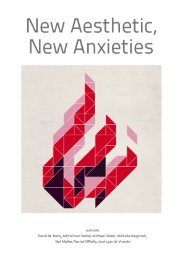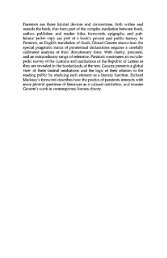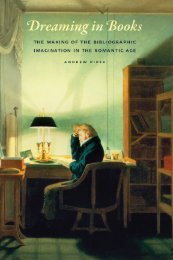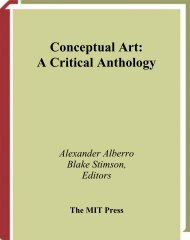You also want an ePaper? Increase the reach of your titles
YUMPU automatically turns print PDFs into web optimized ePapers that Google loves.
unpublished essay 'The Emancipated Spectator' (2004) has begun to do precisely<br />
this task, drawing links between the history of theatre and education, and<br />
questioning theories that equate spectacle with passivity." He argues that the<br />
opposition of 'active' and 'passive' is riddled with presuppositions about looking<br />
and knowing, watching and acting, appearance and reality. This is because the<br />
binary of active/passive always ends up dividing a population into those with<br />
capacity on one side, and those with incapacity on the other." As such, it is an<br />
allegory of inequality. Drawing analogies with the history of education, Ranciere<br />
argues that emancipation should rather be the presupposition of eq uality: the<br />
assumption that everyone has the same capacity for intelligent response to a<br />
book, a play or a work of art. Rather than suppressing this mediating object in<br />
favour of communitarian immediacy, Ranciere argues that it should be a crucial<br />
third term which both parts refer to and interpret. The distance that this<br />
imposes, he writes, is not an evil that should be abolished, since it is the<br />
precondition of any communication:<br />
Spectatorship is not the passivity that has to be turned into activity. It is our<br />
normal situation. We learn and teach, we act and know as spectators who link<br />
what they see with what they have seen and told, done and dreamt. There is no<br />
privileged medium as there is no privileged starting point.<br />
In calling for spectators who are active as interpreters, Ranciere implies that the<br />
politics of participation might best lie, not in anti-spectacular stagings of<br />
community or in the claim that mere physical activity would correspond to<br />
emancipation, but in putting to work the idea that we are all equally capable of<br />
inventing our own translations." Unattached to a privileged artistic medium, this<br />
principle would not divide audiences into active and passive, capable and<br />
incapable, but instead would invite us all to appropriate works for ourselves and<br />
make use of these in ways that their authOrs might never have dreamed possible.<br />
See for example Germano (elant, Ambiente/Arte: dal Futurismo a/Ia Body Art(Venice: Edizioni<br />
La Biennale di Venezia, 1977. Based on Ambiente/Arte exhibition, 1976 Venice Biennale);<br />
Nicholas de Olivier'), et aI., Installation Art in the New Millenium (London: Thames and Hudson,<br />
2003); Claire Bishop, .fnstallation Art: A Critical History(London: Tate Publishing, 2005).<br />
2 See Andre Breton, 'Artificial Hells, Inaugmation of the "1921 Dada Season'" (1921), trans. Matthew<br />
S. Witkovsky in October. 105, Summer 2003, 139: 'Dada events certainly involve a desire other<br />
than to scandalize. Scandal, for all its force (one may easily trace it from Baudelaire to the present),<br />
would be insufficient to elicit the delight that one might expect from an artificial hell. One should<br />
also keep in mind the odd pleasure obtained in "taking to the street" or "keeping one's footing",<br />
so to speak I .. J By conjoining thought with gesture. Dada has left the realm of shadows to venture<br />
16/ /INTRODUCTION








